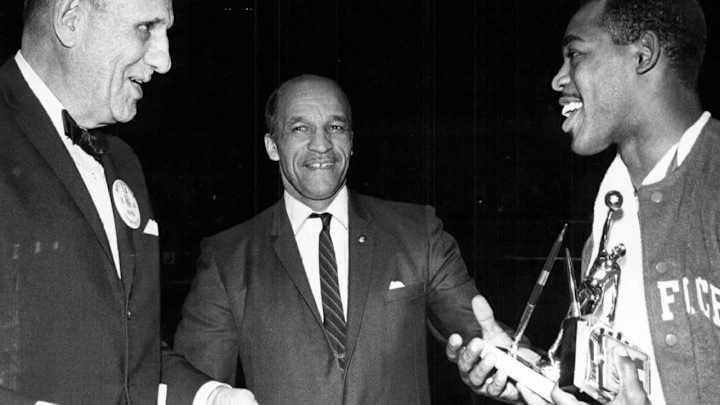Brown: UI Grad John B. McLendon A Pioneer

IOWA CITY, Iowa - I met Coach John B. McLendon before an Iowa basketball game. The year escapes me. But I do remember that I didn’t realize at the time what a giant of a man he was.
McLendon, short in stature, stood tall in the game of basketball. He was a trailblazer in the sport, and was mentored by the game’s inventor, Dr. James Naismith.
McLendon created the four corners offense, which was a significant part of basketball before the arrival of the shot clock. He refined the fast break. More importantly, he was a civil rights pioneer who was instrumental in the integration of college basketball.
McLendon became the first African-American man to coach a major integrated basketball team when the Cleveland Pipers of the National Industrial Basketball League hired him in 1959. He also became the first African-American coach in the ABA when the Denver Rockets (now Nuggets) hired him in 1969.
“He was a genius who everyone emulated,” said former New York Knicks star Dick Barnett, who played for McLendon at Tennessee State. “He made young men understand that dreams in America can come true.”
John McLendon received a master’s degree in physical education from the University of Iowa in 1937. He was presented the University of Iowa Distinguished Alumni Award in 1998. He is the only man to be enshrined in the Naismith Basketball Hall of Fame in two categories. He went in as a contributor in 1979 and a coach in 2016.
He was the only Iowa graduate in the Naismith Basketball Hall of Fame until Don Nelson joined him in 2012. Nelson, who retired as the winningest coach in NBA history, received his Iowa degree in physical education in 2012, 50 years after he left campus to pursue a career as an NBA player.
McLendon, born in Hiawatha, Kan., was living in Kansas City, Kan., when he saw a basketball court for the first time at 10 years of age.
He went to Kansas and learned the game from Naismith, who was teaching there at the time. Naismith had a lasting influence on McLendon. Blacks were not allowed to play basketball at the time. McLendon still tried out for the team, but was cut.
“Naismith didn’t draw up plays,” McLendon once said. “He talked about the essence of the game. I used to go over to his house at night to talk about basketball and life.”
In the book “Breaking Through: John B. McLendon, Basketball Coach and Civil Rights Pioneer,” written by Milton Katz and published in 2007, McLendon said of Naismith, “Everything I did when I was coaching, I can trace back to learning from him.”
Katz also wrote that Naismith saw something in McLendon that he felt was special.
After becoming the first African-American to receive a degree in physical education at Kansas in 1936 and his master’s at Iowa a year later, McLendon pursued a coaching career. He got his first full-time job at Kansas Vocational School near Topeka, Kan. He got the job on a verbal agreement with the principal. When McLendon went back and requested a written contract, the principal declined.
McLendon later touched base with his friend and former Iowa roommate, William F. Burghardt, who was the head of the physical education department at the North Carolina College for Negroes in Durham, N.C.
Burghardt talked McLendon into coming to the school. He was named the head basketball coach and athletic director in 1940, a year after Naismith passed away. That school is now called North Carolina Central.
During his 12-year stay there, the Eagles won eight CIAA titles while playing a fast-breaking style that was ahead of its time. During his stay in Durham, McLendon is credited with bringing about the first integrated college basketball game ever.
Called “The Secret Game,” McLendon put together a scrimmage between his all-black team and an all-white intramural team made up of medical students from Duke on March 12, 1944. McLendon’s team hosted the game, played with no fans allowed and with the gym doors locked. McLendon’s team won, 88-44, a game that was played at a time when the NCAA and NIT tournaments didn’t allow black players to compete.
From there McLendon went to Hampton Institute (1952-54), then had great success at Tennessee State (1954-59) His teams won three consecutive NAIA titles there.
“McLendon’s influence, if not his spirit, will be felt in arenas across the nation, every time a fast break is executed, every time a team presses for 40 minutes,” said the New York Times in 1993. “McLendon didn’t invent the fast break. But as the head coach at Tennessee State between 1954 and 1959, he helped popularize it and widen the concept of what a fast break could be with well-conditioned, athletic players with speed and quickness.”
McLendon left Tennessee State for a job with the Cleveland Pipers of the NIBL. His team won a national AAU title in 1961.
The Pipers joined the American Basketball League in 1962, and McLendon became the first African-American to coach a professional basketball team. From there he went to Kentucky State (1963-66) and then Cleveland State (1966-69), where he became the first African-American head coach at a predominately white institution.
From there McLendon became the first black coach of an ABA team when the Denver Rockets hired him in 1969. The headline in the Des Moines Register that day read:
First A.B.A.
Club to Sign
Negro Boss
McLendon was fired after a 9-19 start. At 54 years of age, his coaching career was over. He was a head coach for 34 years, winning 744 games and leaving behind a lifetime of achievements that impacted the sport he loved and the world we live in.
McLendon, who was also on the coaching staffs of the 1968 and 1972 U.S. Olympic teams, worked as an athletic advisor at Cleveland State and also spoke at numerous basketball clinics after his coaching days had ended.
He passed away in 1999 at 84 years of age. In 2021, McLendon was awarded the Theodore Roosevelt Award. It is the NCAA’s highest honor. It annually goes to someone who “is said to exemplify the ideals and purposes to which collegiate athletics are dedicated.”
